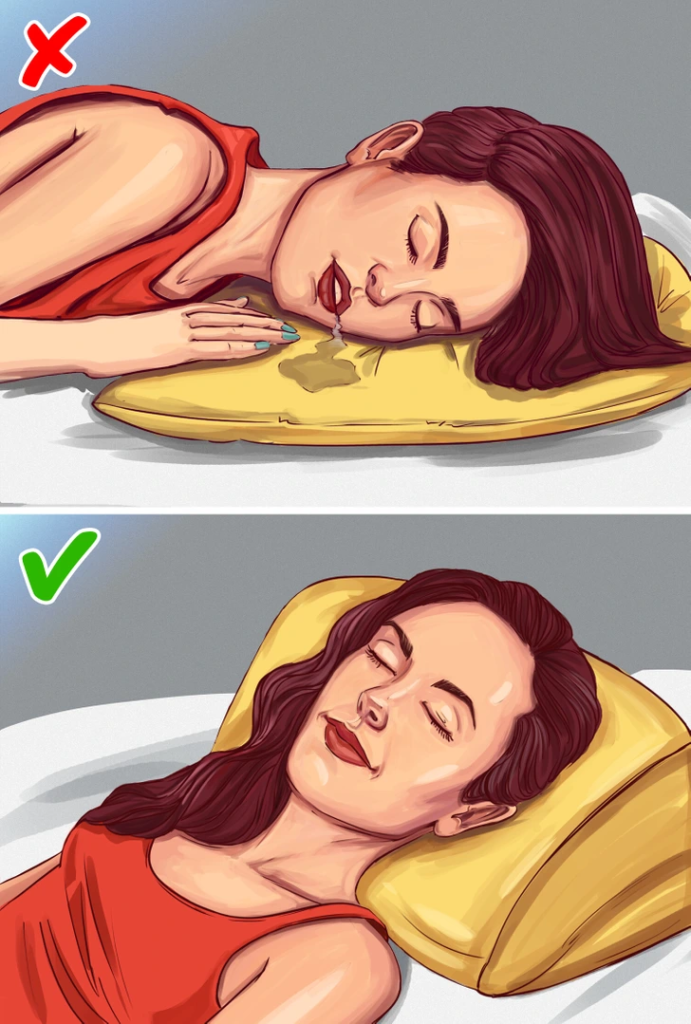Let’s be real—waking up to a damp pillow isn’t exactly a glamorous way to start your day. Sure, it happens to everyone once in a while. But if your drooling habit has gone from once in a blue moon to every single night, it might be time to look a little deeper. Believe it or not, your nighttime saliva spill could be your body’s way of waving a red flag.
So, what’s the deal with drooling? Let’s break down the possible reasons you’re leaking like a faucet and what you can do to fix it—without turning your bedroom into a biology lab.

Why We Drool in the First Place
When we sleep, our facial muscles hit the snooze button. That includes the ones that normally keep our mouth closed and help us swallow. If your mouth falls open and your head tilts just the right way, gravity does its thing. Saliva starts pooling and before you know it—hello, drool.
Now, a little drool here and there? Totally normal. But if you’re waking up soaked or constantly switching pillowcases, it could be a sign of something more.
Video: Drooling in Dreamland: The Science Behind Sleep Salivation
Blocked Nose? That Could Be the Culprit

Ever had a stuffy nose that forced you to breathe through your mouth all night? That’s prime drooling territory. When nasal passages are blocked, your body automatically switches to mouth-breathing—and that’s when the saliva escape begins.
Want to stop that midnight mouth flood? Clear those sinuses. Try a hot shower before bed, use essential oils like eucalyptus, or rub on a decongestant balm. Products like Vicks VapoRub work wonders for helping you breathe easier and keeping your mouth shut (literally) while you sleep.
Sleep Apnea: The Sneaky Sleep Disruptor

Drooling might seem harmless, but paired with loud snoring or waking up feeling exhausted? That could point to sleep apnea—a serious sleep disorder that messes with your breathing patterns.
If you’re dealing with heavy drooling, daytime fatigue, and morning headaches, it’s time to talk to a doctor. Untreated sleep apnea can affect everything from your heart to your mood, and it’s more common than you think—especially if you smoke or carry extra weight.
Is Your Saliva Out of Balance?

Sometimes, your body just produces more saliva than it needs—thanks to factors like dehydration, diet, or even certain medications. This overproduction is called hypersalivation, and it can definitely increase the drool factor.
Here’s a simple hack: suck on a lemon slice before bed. The acidity can stimulate your salivary glands to function better and help thin the saliva. And of course, drink plenty of water. Dehydration forces your mouth to overcompensate by producing more saliva.
Video: Why You Drool When You Sleep and How to Stop It
Don’t Ignore Dental Health

Dental issues might seem unrelated, but they could be playing a quiet role in your drooling saga. Inflammation, cavities, or even misaligned teeth can cause your mouth to rest open during sleep—and boom, saliva slip.
Keep those pearly whites in check. Brush twice daily, floss like you mean it, and visit your dentist regularly. Sometimes, solving drooling is as easy as fixing a tooth problem you didn’t know you had.
How You Sleep Matters More Than You Think

If you’re a side or stomach sleeper, you’re practically inviting saliva to spill out. Sleeping face-down makes it easier for gravity to do its job, and let’s just say gravity’s relentless.
Try sleeping on your back instead. Not only does it help contain the drool, but it also supports your spine and reduces facial puffiness. Need help staying in place? Wedge some pillows around you so you don’t roll over by accident.
Raise Your Head, Reduce the Flow

Another easy adjustment? Elevate your head. Sleeping with a slightly higher pillow helps keep your mouth closed and your airways open. Just make sure your neck is supported too—no one wants a drool-free night that ends in a stiff neck.
Allergies Could Be Stirring Things Up

If your allergies are out of control, your body might be producing excess mucus and saliva—leading to congestion, mouth-breathing, and yes, drooling. Dust mites, pollen, pet dander… any of these can be culprits.
Get tested for allergies and take control of your environment. An air purifier or even regular vacuuming could make a big difference in how well you breathe—and how dry your pillow stays.
Humidifiers: The Unsung Heroes of Sleep Hygiene

Dry air can mess with your breathing in ways you wouldn’t expect. When your nose dries out, your body switches to mouth-breathing. And we already know what that leads to—hello, drool puddle.
Running a humidifier at night helps keep your airways moist, especially during winter or in dry climates. It might just be the easiest upgrade to your sleep setup.
Conclusion: Your Pillow Isn’t the Problem—But Your Health Might Be Trying to Tell You Something
Look, drooling in your sleep isn’t the end of the world. Most of the time, it’s just a quirky little body glitch. But if it’s happening night after night, soaking your pillow like clockwork, then it’s probably time to stop ignoring it.
Whether it’s nasal congestion, sleep apnea, or something as simple as your sleeping position, your body could be dropping hints about your overall health. Tuning in now could save you from bigger issues down the road.
So the next time you wake up in a puddle of your own spit, don’t just flip the pillow and move on. Think of it as a message—and maybe, finally, time to take action